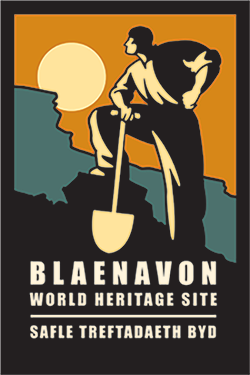The Blaenavon Partnership
The following list describes the partners and their interests in the World Heritage Site:
Torfaen County Borough Council (TCBC): is the lead authority in the Blaenavon Partnership. TCBC is the Unitary Authority for over 50% of the site including the town of Blaenavon and has full local government powers and duties including Town and Country Planning and other environmental matters.
Monmouthshire County Council (MMC): covers just under 50% of the inscribed site. MCC is a unitary authority will full local government powers. However, planning responsibility for nearly all of this area resides with Brecon Beacons National Park Authority.
Brecon Beacons National Park Authority (BBNPA): about 45% of the Blaenavon Industrial Landscape falls within the Brecon Beacons National Park. The purposes of the National Park designation, as amended under the Environment Act 1995, are to conserve and enhance the natural beauty, wildlife and cultural heritage of the area and to promote the understanding and enjoyment of its special qualities. Account must be taken of the economic and social interest of residents. The National Park is the local planning authority for the area within its boundary.
Blaenau Gwent County Borough Council (BGCBC): None of the inscribed site falls within the Blaenau Gwent County Borough Council administrative area. However, as a near neighbour BGCBC has a close interest in the designation and management of the proposed World Heritage Site.
Blaenavon Town Council (BTC) the local council for the town of Blaenavon, which is the main settlement within the inscribed site. There is a special working arrangement between Torfaen CBC and BTC through an established Strategy Group which has an annual budget of £50,000.
Cadw: Welsh Historic Monuments (Cadw): Cadw is a Welsh word which means 'to keep'. Cadw is the Welsh Assembly Government's historic environment division. It aims to protect and sustain, encourage community engagement in, and improve access to the historic environment of Wales. This includes historic buildings, ancient monuments, historic parks, gardens and landscapes, and underwater archaeology. Cadw also has direct responsibility as the guardian of Blaenavon iron works.
Visit Wales: Visit Wales is the Welsh Assembly Government’s tourism team, within the Department for Heritage. Visit Wales is responsible for the promotion and development of tourism in Wales.
Royal Commission on the Ancient & Historical Monuments of Wales (RCAHMW): is the national body of survey and record. Its aim is to compile and make available an archive of Wales’ historic buildings and ancient monuments for use by individuals and bodies concerned with understanding, conserving and managing the built environment.
National Museum Wales (NMW): exists to preserve and promote the heritage and culture of Wales, within a world context. NMW has a requirement from its Royal Charter to ‘promote understanding and knowledge of the special industries of Wales through the collection and conservation of artefacts and their research, interpretation and display’. NMW has specific responsibility for the management of the Big Pit National Coal Museum. Its special expertise in conservation and management of sites is available on a day-to-day basis to the Blaenavon Partnership.
The Countryside Council for Wales (CCW): is the Government's statutory advisor on sustaining natural beauty, wildlife and the opportunity for outdoor enjoyment in Wales and its inshore waters. CCW champions the environment and landscapes of Wales and its coastal waters as sources of natural and cultural riches, as a foundation for economic and social activity, and as a place for leisure and learning opportunities. CCW aims to make the environment a valued part of everyone's life in Wales.
The Welsh Assembly Government (WAG) Department for the Economy and Transport (DET): recently centralised the roles of the Welsh Development Agency (WDA). This department deals with economic development, regeneration and environmental improvements and officers representing these various interests will continue to serve on the Blaenavon Partnership Steering Group.
British Waterways (BW): has responsibility for the management and maintenance of British Waterways Canals, including in Monmouthshire and Brecon Canal. One of the principal remits of the board is to respect industrial heritage.
Networking
The Blaenavon World Heritage Site Partnership networks widely. Organisations we work with include the World Heritage UK (WH:UK) and the European Route of Industrial Heritage (ERIH).
